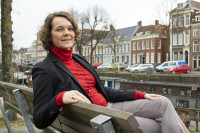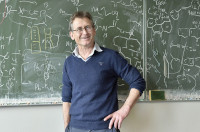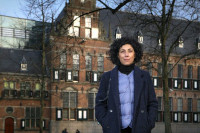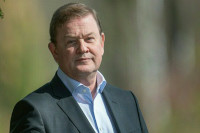Magazine articles, January - July 2021
Moving up in the world through good education

Mineke van Essen is a history educator and an Emeritus Professor who has more than forty years of research into the history of higher education under her belt. She plans to continue sharing her insights into this field with students, junior teachers and the wider public, even after leaving her emeritus position.
Lees meer
Inspired by birds
David Lentink combines engineering with biology

Birds are much more efficient flyers than drones. David Lentink, an aerospace engineer and biologist, studies birds in order to find new ways to fly, and also to better understand the biomechanics of bird flight. He recently moved from Stanford University to the University of Groningen, one of very few places where he can combine his love for engineering with his love for biology.
Read more
How Darwin offers an alternative for pesticides

Pesticides can protect crops against harmful invaders, but they can also be very damaging to nature. Unfortunately, there are not always good environmentally-friendly alternatives. The deployment of the natural enemies of pests could offer a solution. For my PhD research, I am studying how we could improve natural enemies for biological crop protection.
Read more
From ‘closed’ science to Open Science
Vera Heininga takes the lead

In January 2021, Vera Heininga was appointed Open Science coordinator and future programme leader of the upcoming Open Science programme of the University of Groningen. In 2017, Heininga defended her PhD thesis, which focused among other things on problems concerning the reproducibility of research and, together with her colleagues, she created the Open Science Community Groningen (OSCG).
Read more
‘Take a close look at the content of diversity training courses’

The first thing that Floor Rink, Professor of Organizational Behaviour, wants to put out there is that devoting attention to diversity in the workplace is always a good thing. But she also emphasises that we sometimes end up repeating ourselves. Organizations continue to offer the same training courses and introduce the same measures, even though these sometimes have a limited effect. How can we make existing initiatives more effective?
Read more
Speech technology: so much more than a voice assistant

‘Hey Google! Tell me a joke.’ Speech technology is increasingly becoming part of our everyday life. For many people, it is no more than a fun gimmick built into a telephone or a virtual assistant. But the underlying technology can be used for very serious applications, for example in the medical world or in preserving languages and cultures, explains Matt Coler.
Read more
‘Don’t underestimate older employees!’

Are older employees slower and less competent? Should we see old age as a murky, grey future? Susanne Scheibe wants nothing to do with these stereotypes. ‘My field shows that these negative ideas are completely unfounded. Being older has lots of advantages.’
Read more
Why do we believe misleading advertisements and ‘fake’ news?

How impressionable are we? When and why do we believe misleading advertisements, ‘fake’ news and misinformation? These are the questions that Bob Fennis, Professor of Consumer Behaviour, aims to answer. He is one of several UG researchers who recently received a Dutch Research Council (now) grant of €750,000.
Read more
Encouraging young people, that’s my most important job’

Four and a half years ago, he received the Nobel Prize. During the award ceremony in Stockholm, Ben Feringa made a resolution: I will put science on the map. His mission is being given a new boost with the establishment of the Ben Feringa Fund, which aims to increase public interest in science, starting with a science quiz and a tour of secondary schools.
Read more
‘Give people with dementia more freedom to organize their own social lives’

Older people with memory problems who live at home are extraordinarily resourceful when it comes to staying in control of their activities outside the home. Demographers Jodi Sturge and Mirjam Klaassens are certainly impressed. ‘It’s not about whether these people can do more than we think, but rather they can do more than we allow them to. The stigma of dementia is their biggest problem.’
Read more
When government fails its citizens

More and more often, we are seeing how people can find themselves in trouble because of the actions of government. Why does the government take such a hard line in these cases, and what can be done about it? Professor of Social Security Law Gijsbert Vonk and member of the House of Representatives and alumna Renske Leijten (SP) discuss the human dimension of the welfare state.
Read more
Understanding the unpredictable

Researcher and keen sailor Wander Jager wants to understand all there is to know about human behaviour, influence and choices, and tipping points in public opinion. As humans are as unpredictable as it gets, his simulation models include every imaginable possibility so that he can make sense of the chaos.
Read more
Why is crisis communication so difficult?

What is best way for authorities to communicate about potential crisis situations? Francesca Giardini has been pondering this question since experiencing the after-effects of an earthquake in her home city. She is studying how social interaction increases or reduces people's perception of danger. She hopes that this will give us a better understanding of human behaviour in situations such as the current coronavirus pandemic.
Read more
Honorary Doctor Feike Sijbesma: ‘I know about the problem, and so does the rest of the world’

Feike Sijbesma, former CEO of biochemical company DSM, received an honorary doctorate from the University of Groningen in early 2021. The reason was his many years of commitment as a ‘captain of industry’ to healthier food, international food aid and the climate crisis.
Read more
Facing up to Parkinson’s disease: is there any hope of a cure?

PhD student Laura Nederveen is conducting research into Parkinson’s disease at the University of Groningen (UG). She is focusing on identifying causes of the disease, rather than on ways of implementing her knowledge. At least, until her uncle developed Parkinson’s.
Read more
Why do we have more or fewer children?

Hilde Bras is one of the new Aletta Jacobs professors at the University of Groningen. She looks for explanations for demographic developments. Family relationships seem to have a significant influence.
Read more
Fascinated by serotonin

Jocelien Olivier is fascinated by one of the most influential neurotransmitters in our brain, serotonin. It affects our mood, sleep, appetite, social and sexual behaviour, memory and emotions. In her research at the Groningen Institute for Evolutionary Life Sciences (GELIFES), she is trying to find out what role serotonin plays in human development. She is doing this, among other things, by looking at the use of antidepressants during pregnancy.
Read more
Religious heritage: age-old culture in contemporary communities

Many people don’t have a clear idea of the importance of religious heritage. Student assistants Kjelda Glimmerveen and Loïs Bakker explain the situation – but they believe that young people can also develop an interest in heritage if you let them see and experience it.
Read more
Talking about illness and pain

Communication and health. There is plenty to say on the matter, particularly now with the pandemic and with obesity on the rise. Jana Declercq, whose PhD research focused on health news, has been awarded a Veni grant and is now studying how patients and practitioners in a specialized clinic discuss chronic pain. Last but not least, she is a fervent advocate for the proper and sensible use of metaphors.
Read more
The Commandos: Who has got what it takes?

Sports teams, employers and universities all want the same thing: a good selection of candidates. They want the best athletes, the best applicants and the best students, who take to their new environment like a duck to water. And the Dutch Commando Corps (KCT) is no different. On the KCT’s behalf, Ruud den Hartigh is investigating how they can make sure that they select good commandos.
Read more
Treat loneliness as a diverse problem

Long-term loneliness is a widespread societal problem with huge consequences. Breaking down social isolation would seem to be the most obvious solution. But according to social psychologist Luzia Heu, this may not always be the case. Having an extensive, close social network will not always protect people from loneliness. Heu wants to see more attention being paid to individual and cultural differences.
Read more
‘Being evicted is a traumatic experience’

Every year throughout the world, hundreds of thousands of people are evicted from their homes. And yet housing is an international fundamental right. Which criteria do the courts use to decide whether or not to evict someone? ‘Neighbourhood Professor’ Michel Vols has been awarded a substantial European grant that will allow him to spend the next five years studying this question.
Read more
Magical belief in IT systems

“What exactly are you worried about?” When she gave her first lectures on data protection some 15 years ago, associate professor in IT law Aline Klingenberg was often obliged to explain her own concerns. But as time passed, the question became easier to answer. ‘These days, the consequences of not handling personal data with care are clear for all to see. We have the technological ability to collect and use all kinds of personal data, but having the ability to do something doesn't necessarily mean that you should.’
Read more
Artificial Intelligence makes decisions in uncertain situations

Policymakers often have to base their decisions on very limited information. Some of these decisions may have a serious impact on society in the future. The world of small business is also prone to uncertainty when making decisions, despite potentially huge consequences for both business owners and customers. As a postdoc researcher in the Operations Department of the Faculty of Economics and Business (FEB), Albert Schrotenboer* conducted research in the field of Operations Research (OR). He used mathematical decision models and artificial intelligence (AI) to optimize decisions in which uncertainty plays a large role.
Read more
Getting the energy transition done together

Groningen is building up to Climate Adaptation Week, an online, interactive festival revolving around the consequences of, and solutions to, climate change. It is a theme that is close to the heart of business expert Björn Mitzinneck. ‘Many of the really tricky problems we face involve people making not particularly smart choices. I’m really interested in how you organize people for the collective good.’
Read more
The energy transition can be nice, if you’re smart about it!

All is quiet in the Mercator Building, the home base for the Faculty of Spatial Sciences. On the third floor, we see portraits of former professors, including Henk Voogd, the first professor of spatial planning and design, who would have undoubtedly loved to have taken on the issues associated with climate adaptation and the energy transition. Christian Zuidema is working on the energy transition and its consequences for humans and the landscape.
Read more
Climate CEO Verkooijen: prophet in a suit and tie

Professor Patrick Verkooijen is the boss of the Global Center on Adaptation. This international organization helps countries in Africa and Asia to prepare for global warming. Verkooijen is closley involved in the Climate Adaptation Summit in January.
Read more
